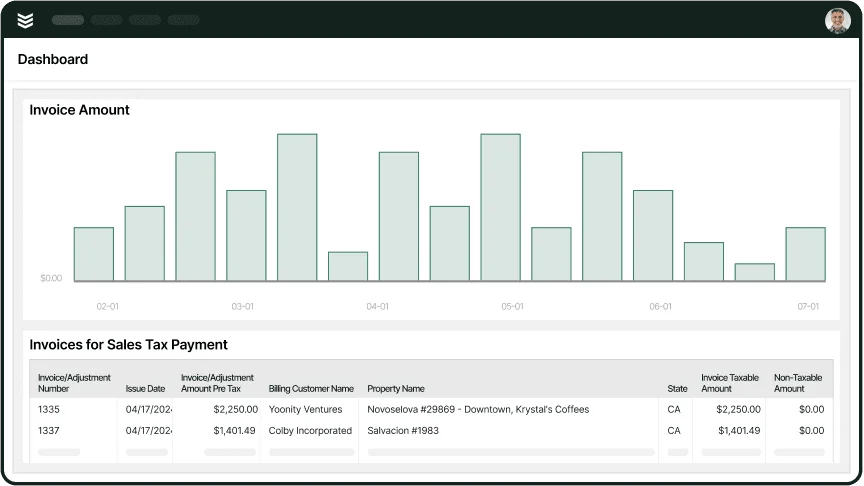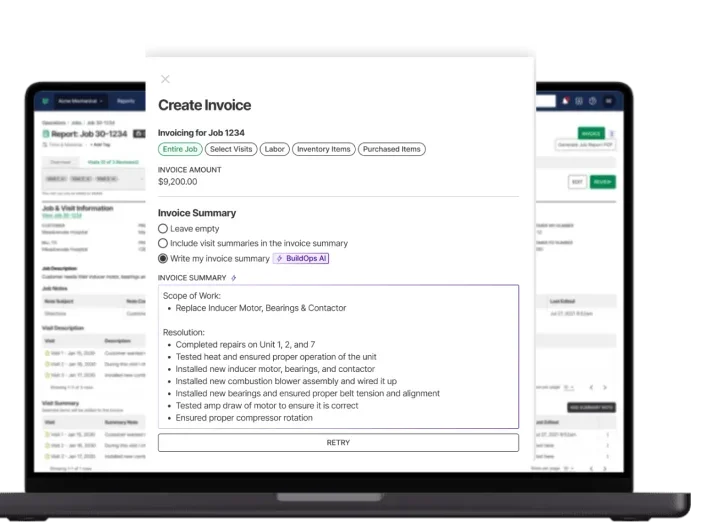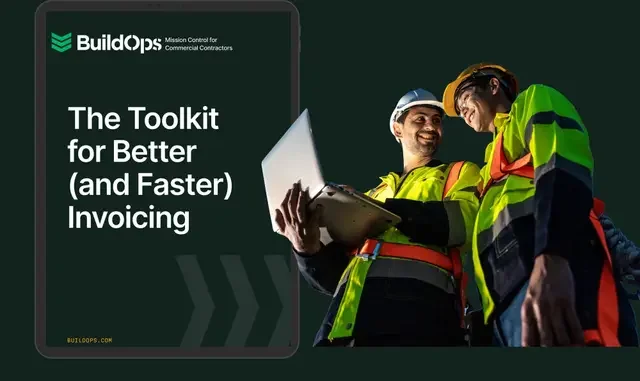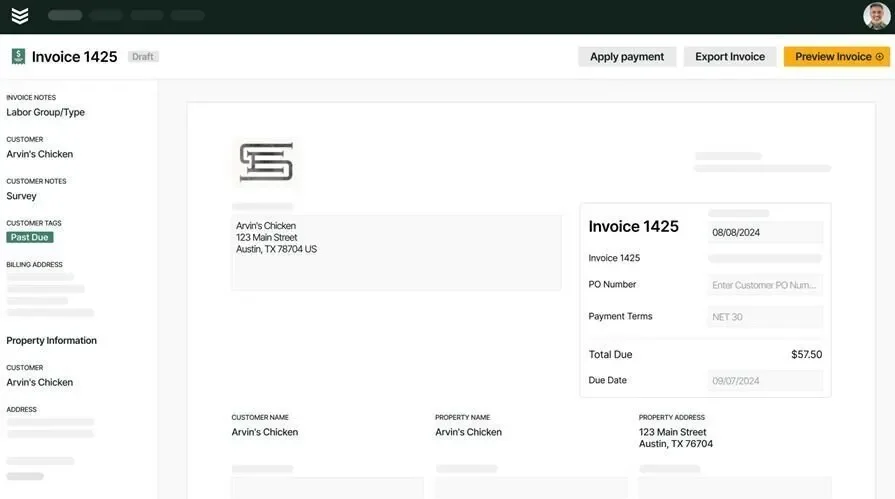Staying on top of invoices is critical for any electrical business, but without the right tools, it can quickly turn into a time-consuming mess. The right invoicing software helps contractors send accurate bills, track payments, and keep cash flow steady—without drowning in paperwork. In this guide, we’ll break down everything you need to know, including:
- Choosing the right electrical contractor invoicing software for your team
- 6 key features to look for in invoicing software for electrical contractors
- Best for commercial
- Best for residential
- Best for general contractors
- Other invoicing software for electrical contractors
- 7 benefits of using electrical contractor invoice software
- 4 important electrical contractor invoicing software FAQs answered
To find the right invoicing software for electrical contractors, you need to think beyond basic billing—considering factors like job costing, mobile access, and integrations with existing workflows. The next section breaks down what to look for when choosing an invoicing tool that works for your team.
Choosing the right electrical contractor invoicing software for your team
Invoicing software should fit the way your electrical business operates. Whether you're handling service calls or managing large projects, the right tool simplifies billing, tracks payments, and integrates smoothly into your workflow. Before making a decision, electrical contractors should consider key factors to ensure the system meets their needs.
- Ease of use – Does the software make invoicing straightforward? Can your team learn it quickly without disrupting daily operations?
- Job costing and estimates – Can you create accurate estimates and convert them into invoices without extra steps? Does it help track labor and materials efficiently?
- Integration with existing tools – Will the software sync with accounting programs, scheduling systems, and other business applications you already use?
- Mobile accessibility – Can technicians generate invoices, collect payments, and update job details from the field?
- Features – Does it offer automated reminders, digital payment options, and reporting tools that help manage cash flow?
It’s important to understand what makes an invoicing system truly effective. The next section explores the key features electrical contractors should look for when choosing software.
6 key features to look for in an invoicing software for electrical contractors
The right invoicing software keeps your electrical business organized and cash flow steady. Electrical contractors and field service techs deal with job costing, scheduling, and payments daily. Without a system designed for the trade, invoices pile up, payments get delayed, and operations slow down. When invoicing is done manually or through outdated systems, tracking payments and ensuring accuracy becomes a challenge. A well-built invoicing software streamlines these processes, allowing contractors to stay focused on the job instead of paperwork.
Here are 6 key features you should look for in an electrical contractor invoicing software:
1. Automated quoting and job costing
Accurate estimates and real-time job costing help contractors maintain profitability. A system that integrates quoting software for electrical contractors allows seamless transitions from estimates to invoices without duplicate data entry. Consider a contractor preparing a bid for a large-scale wiring project. Without software that connects job quotes to invoices, costs might be underestimated, leading to lost revenue. A quoting platform built for electrical contractors ensures every material and labor cost is captured upfront, preventing miscalculations.
2. Secure and flexible payment processing
Collecting payments on time keeps cash flow stable. A payment solution integrated with invoicing software helps contractors offer multiple payment methods, set up automated reminders, and track outstanding balances. For instance, a client receives an invoice but keeps delaying payment due to inconvenient options. Instead of waiting weeks for a check, a system with payments for invoicing software enables instant credit card transactions or ACH transfers, ensuring contractors get paid faster.
3. Automated scheduling and dispatching
Efficient invoicing starts with organized job scheduling. When a contractor sends an invoice, it should be based on accurate labor and material tracking, which depends on a well-structured dispatch system. An invoicing software that integrates scheduling for electrical contractors ensures that every service call and project is properly accounted for, reducing billing errors.
Think about a service technician rushing from one job to another while the office scrambles to keep track of completed work. Without a system that links dispatching and invoicing, paperwork gets lost, and billing mistakes happen. A tool designed with scheduling for electrical contractors in mind ensures that completed jobs are automatically recorded, reducing errors and keeping payments on track.
4. Mobile access for technicians
Field techs need to generate and update invoices without returning to the office. With a mobile app, electrical technicians can complete jobs, record materials used, and send invoices directly from their devices. Picture a technician finishing a panel installation at a commercial site. Instead of writing notes to submit later, they update the invoice on their phone, collect a digital signature from the client, and process the payment instantly. This eliminates delays and ensures every job is billed correctly before leaving the site.
5. Integrated fleet tracking
Keeping track of company vehicles ensures technicians arrive on time, and fuel costs stay under control. Invoicing software with fleet management for electrical contractors lets businesses monitor vehicles in real-time, helping optimize routes and reduce expenses. Imagine a dispatcher needs to send a technician to an urgent repair job but has no idea which vehicle is closest. Wasted fuel, late arrivals, and frustrated clients become the norm. A system that incorporates fleet management for electrical contractors improves response times and keeps job schedules running smoothly.
6. Advanced reporting and analytics
Real-time insights help electrical contractors make informed decisions. A system with robust reporting capabilities provides financial summaries, unpaid invoice tracking, and revenue forecasting.
For example, a business owner notices cash flow issues but can’t pinpoint the cause. By using reporting for invoicing software, they quickly identify unpaid invoices and adjust their collections process, improving profitability without guesswork.

Equip yourself with the tools you need
BuildOps Invoicing helps teams streamline billing so they always get pad on time.
Other valuable features to look for in an electrical contractor invoice software
Beyond the essential tools, certain features can further improve how electrical contractors manage invoices, track payments, and streamline financial workflows. While not mandatory, these additions help businesses maintain steady cash flow, reduce billing errors, and improve client relationships.
- Service agreements: Managing recurring invoices for maintenance contracts is much easier with service agreements for invoicing software that automates renewals and scheduled billing. This ensures payments are collected on time without the hassle of manual follow-ups. Explore service agreements for invoicing software.
- Technician time tracking: Accurate labor tracking ensures invoices reflect the actual time spent on a job. A system with time tracking for invoicing software automatically records billable hours, reducing disputes and making payroll integration seamless. Learn how time tracking features can enhance your invoicing capabilities.
- Pipeline and lead management: Converting estimates into invoices requires an efficient sales pipeline. A tool with pipeline management for invoicing software helps electrical contractors track potential jobs, follow up on quotes, and turn leads into paying customers. Find out more about pipeline management for invoicing software.
With these additional features, invoicing software becomes a more powerful tool for managing payments and business growth. Now, let’s explore the best software options for electrical contractors based on different business needs.
Best for commercial: BuildOps
BuildOps is designed specifically for commercial electrical contractors, offering a complete invoicing system that connects seamlessly with job costing, dispatching, and scheduling. Unlike general invoicing software, BuildOps is built for complex commercial projects, where tracking labor, materials, and service history is critical.
It allows contractors to generate detailed, professional invoices directly from completed work orders, ensuring that no billable hours or materials slip through the cracks. With built-in automation, it reduces manual data entry and speeds up payment collection, helping businesses maintain steady cash flow. Plus, its real-time financial reporting gives contractors full visibility into their revenue, outstanding invoices, and profitability on every job.
How Pricing Works: We provide weekly live demos and the opportunity to schedule a customized session where we help you explore features and select the best option for the needs of your business.
Features Beyond Invoicing: BuildOps does more than invoicing, offering tools for service agreements, job costing, and dispatching to keep operations running efficiently. These features help electrical contractors manage ongoing contracts, create accurate estimates, and ensure technicians are scheduled effectively.
What Sets It Apart For Commercial: BuildOps is built specifically for large-scale electrical work, making it ideal for contractors handling multi-phase projects, service agreements, and high-volume job sites. Unlike generic invoicing platforms, it provides detailed financial tracking, integrates with project management tools, and offers automated workflows designed for commercial operations.

Curious to see how BuildOps works?
Learn how BuildOps Invoicing software can automate your entire invoicing process.
Best for residential: Housecall Pro
Image Source: Housecall Pro
Housecall Pro is a strong choice for residential electrical contractors, offering an easy-to-use invoicing system tailored to service businesses. It’s designed to help electricians create and send invoices quickly, process payments on-site, and keep track of client billing history. However, its focus on residential work means it may not be ideal for larger, commercial-scale projects.
How Pricing Works: Housecall Pro follows a tiered pricing model, with monthly plans starting at around $79 for basic invoicing features, scaling up to more advanced options.
Features Beyond Invoicing: In addition to invoicing, Housecall Pro provides customer relationship management (CRM), online booking, and automated follow-ups to help electricians keep track of clients and secure repeat business.
What Sets It Apart for Residential: Housecall Pro makes it easy for electricians to generate invoices and get paid on-site, reducing delays in payment collection. It’s designed with residential contractors in mind, offering features that cater to smaller-scale jobs and recurring service work. However, for electrical businesses handling commercial or multi-phase projects, it may lack the advanced financial tracking and job costing tools needed.
Best for general contractors: Jobber
Image Source: Jobber
Jobber is an all-in-one invoicing and service management software that works well for electrical contractors who operate as general contractors or offer a range of services. It provides a simple invoicing process with automated reminders and payment tracking. Yet, it lacks specialized features for commercial electrical projects, making it better suited for small to mid-sized operations.
How Pricing Works: Jobber offers pricing plans starting at around $129 per month for basic invoicing features, with higher-tier plans providing additional tools for scheduling and workflow automation.
Features Beyond Invoicing: Jobber includes job scheduling, client management, and automated follow-ups to help general contractors streamline operations and maintain customer relationships.
What Sets It Apart for General Contractors: Jobber is designed for contractors managing multiple services, making it useful for electrical professionals who also handle HVAC, plumbing, or other trades. While it offers solid invoicing tools, it may not be ideal for contractors needing advanced job costing, commercial project tracking, or integrated dispatching.
Other notable invoicing software for electrical contractors
While some invoicing tools are tailored for specific types of electrical work, others provide more general solutions that may still be worth considering. These platforms offer useful invoicing features but may lack specialized tools for large-scale commercial projects or complex job costing. Electrical contractors should weigh the pros and cons of each option based on their business needs.
Joist
Image Source: Joist
Joist is a simple invoicing solution designed for contractors in various trades, including electrical work. It allows electricians to create professional invoices, track payments, and send estimates quickly. This makes it a great fit for independent electricians or small businesses that don’t need complex financial tracking. Larger operations, however, may find it lacks advanced reporting and automation features.
How Pricing Works: Joist offers a free plan with basic invoicing features, while its Pro plan, which includes automated reminders and branding customization, starts at approximately $15 per month.
Features Beyond Invoicing: Joist also provides basic estimating tools, client management, and expense tracking, which can be helpful for small electrical businesses.
What Sets It Apart for Independent Electricians: Joist is an accessible option for solo electricians who need a no-frills invoicing solution. Its simplicity makes it easy to use, but it may not be the best fit for companies handling high-volume service calls or complex commercial jobs.
FieldEdge
Image Source: FieldEdge
FieldEdge is a field service management software with built-in invoicing tools. It integrates with QuickBooks and provides real-time tracking of jobs and payments. It’s particularly useful for service-based electricians who handle frequent customer visits and need an invoicing system that works alongside dispatching and customer management. While it excels at managing service calls and tracking invoices, it may not offer the advanced financial reporting or large-scale project management tools needed for contractors handling multi-phase commercial jobs.
How Pricing Works: FieldEdge operates on a custom pricing model, requiring businesses to request a quote based on their needs.
Features Beyond Invoicing: In addition to invoicing, FieldEdge includes customer relationship management (CRM), dispatching, and technician tracking to help electricians manage operations.
What Sets It Apart for Service-Based Electricians: FieldEdge is ideal for electricians who provide ongoing maintenance or emergency repairs. While it excels at managing service calls and tracking invoices, it may not offer the advanced financial reporting needed for larger contracting firms.
Workiz
Image Source: Workiz
Workiz is built for electricians handling emergency electrical services, helping them manage urgent job requests, track technician availability, and generate invoices quickly. The software allows businesses to accept payments over the phone, reducing delays in high-pressure situations where fast turnaround is essential. While it excels at handling emergency jobs, it may not be the best fit for contractors who require advanced job costing and long-term project tracking.
How Pricing Works: Workiz offers a basic plan starting at $45 per month, with higher-tier plans including additional automation and team management features.
Features Beyond Invoicing: Workiz provides team scheduling, call tracking, and payment processing, making it well-suited for businesses that prioritize fast response times.
What Sets It Apart for Emergency Electrical Services: Workiz is great for electricians who need to manage rapid-response service calls. It ensures invoices are sent immediately after a job is completed, speeding up the payment process. However, it may lack some of the deeper project tracking tools needed for long-term contract work.
FieldPulse
Image Source: FieldPulse
FieldPulse is designed for small electrical businesses looking for an all-in-one invoicing and business management solution. It offers estimating, invoicing, and scheduling tools, making it a solid choice for companies that need more than just a basic invoicing system. It helps streamline daily operations, but for larger firms with multiple crews and more complex financial needs, it may lack the scalability and advanced reporting features found in enterprise-level solutions.
How Pricing Works: FieldPulse’s pricing starts at around $89 per month for a team of two, with additional fees for extra users.
Features Beyond Invoicing: The software includes customer management, job tracking, and inventory management, helping electricians stay organized.
What Sets It Apart for Small Electrical Businesses: FieldPulse is ideal for smaller contractors who need a simple, integrated invoicing and scheduling solution. While it’s effective for managing daily operations, it may not have the scalability required for larger firms with multiple crews.
7 benefits of using electrical contractor invoice software
Electrical contractors juggle multiple jobs, technicians, and clients while keeping track of invoices and payments. Without the right invoicing software, paperwork piles up, payments get delayed, and errors creep in. A system built for the trade helps streamline billing, improve cash flow, and eliminate administrative headaches. Here’s how the right invoicing software benefits electrical contractors.
1. Faster payments and improved cash flow
Delayed payments can disrupt an electrical business’s entire operation. Invoicing software automates payment reminders, offers digital payment options, and reduces time spent chasing unpaid invoices. This keeps revenue flowing and ensures contractors get paid on time without unnecessary back-and-forth.
Expert Tip
According to our recent data, contractors who invoice within 24 hours of job completion are 75% more likely to receive payment on time. Waiting even a few days can cause major delays in cash flow. Learn how to hit the invoicing sweet spot and avoid revenue bottlenecks by using invoicing software that keeps billing tight and timely.
2. Better scheduling and job tracking
Invoices should match the actual work completed, but without a proper system, tracking job details can be a challenge. When electrical contractor scheduling software integrates with invoicing, every completed task is logged automatically, making it easier to generate accurate bills. Learn more about the benefits of electrical contractors utilizing scheduling software with their invoicing.
3. Fewer billing errors and disputes
Misquoted labor hours or missing material costs can lead to client disputes and delayed payments. Invoicing software calculates labor, parts, and service fees automatically, reducing human error. This ensures contractors send out precise invoices that clients can trust.
4. Easier management of client relationships
Maintaining strong client relationships is just as important as completing quality electrical work. With CRM for electrical contractors, businesses can track past invoices, send follow-ups, and personalize service agreements, all in one platform. See how the top CRM software for electrical contractors helps improve client management by tracking past invoices, sending follow-ups, and personalizing service agreements, all in one platform.
5. More time for fieldwork, less paperwork
Manually processing invoices takes time away from actual jobs. A well-designed invoicing system allows contractors and office staff to generate invoices instantly, cutting down on administrative work. This means electricians can focus on installations, repairs, and service calls instead of dealing with paperwork.
6. Improved financial reporting and forecasting
Understanding cash flow is crucial for long-term business growth. Invoicing software provides detailed financial reports, helping contractors track revenue, monitor unpaid invoices, and predict future earnings. With this data, electrical businesses can make informed financial decisions.
7. Easier tax preparation and expense tracking
Tax season can be stressful when records are disorganized. Invoicing software automatically tracks income, expenses, and tax-deductible costs, making it easier to generate financial reports. This simplifies tax preparation and ensures contractors don’t miss out on deductions. A well-built invoicing system does more than just send bills—it transforms how electrical businesses handle payments, scheduling, and client relationships. By choosing the right software, contractors can eliminate inefficiencies and focus on growing their business.

Getting paid on time shouldn’t be a battle
We help electrical contractors automate billing, track payments, and reduce errors.
4 important electrical contractor invoicing software FAQs answered
Electrical contractors often have questions about invoicing software—how it works, whether it’s worth the investment, and how to implement it effectively. Below are clear answers to common concerns, helping contractors make informed decisions about choosing the right system.
1. What is electrical contractor invoicing software?
Electrical contractor invoicing software is a digital tool that helps businesses create, send, and track invoices efficiently. It automates billing, reducing manual work and errors. Features like job costing, time tracking, and payment processing ensure contractors are paid accurately and on time.
This software is designed specifically for the electrical trade, allowing contractors to generate invoices directly from work orders, sync with scheduling tools, and track outstanding payments. Centralizing financial data simplifies bookkeeping and improves cash flow management.
2. How does invoicing software for electrical contractors work?
Invoicing software streamlines the billing process by automating key financial tasks. Here’s how it typically works:
- Job completion: Once a job is finished, technicians log materials, labor hours, and any additional costs.
- Invoice generation: The software automatically pulls job details into an invoice, ensuring accurate pricing.
- Client notifications: Customers receive digital invoices via email or text, reducing paperwork delays.
- Payment processing: Clients can pay directly through integrated options like credit cards, ACH transfers, or mobile payments.
- Tracking and reporting: The system monitors unpaid invoices, sends reminders, and generates financial reports to help contractors track revenue.
3. Is invoicing software worth the cost for electrical contractors?
Yes, invoicing software is a valuable investment for electrical contractors. It reduces billing errors, speeds up payment collection, and minimizes time spent on administrative work. By automating tasks like payment reminders and financial reporting, it helps businesses maintain steady cash flow and avoid revenue loss.
Additionally, many invoicing platforms integrate with other essential tools like scheduling, CRM, and accounting software, making it easier to manage operations from one place. The time and cost savings often outweigh the initial investment, especially for contractors managing multiple jobs and clients.
4. What are some best practices to follow when implementing invoicing software as an electrical contractor?
To get the most out of invoicing software, electrical contractors should follow these best practices:
- Choose a system that integrates with existing tools – Ensure compatibility with scheduling, dispatch, and accounting software
- Set up automation for payment reminders – Reduce overdue invoices by configuring automatic follow-ups
- Customize invoice templates – Include branding, clear payment terms, and itemized job details for professionalism
- Train technicians and office staff – Make sure everyone knows how to input job data and generate invoices correctly.
- Enable mobile access for field technicians – Allow techs to create and send invoices directly from job sites
- Regularly review financial reports – Track revenue, outstanding payments, and cash flow trends for better decision-making
- Offer multiple payment options – Give customers the flexibility to pay via credit card, ACH, or mobile payments
- Keep client records organized – Store invoice histories and client details for easy follow-ups and recurring services
By following these steps, electrical contractors can streamline their invoicing process, reduce payment delays, and improve overall business efficiency.
Managing invoices is a crucial part of running a successful electrical business, but not all invoicing software is built to handle the complexities of commercial field service work. While many tools offer basic billing features, most lack key functions like integrated scheduling, advanced job costing, and real-time financial reporting. Electrical contractors need a system that not only simplifies invoicing but also connects seamlessly with their day-to-day operations.
That’s where an all-in-one platform makes the difference. BuildOps brings together invoicing, dispatching, job tracking, and financial reporting in one seamless system—something that standalone invoicing tools can’t match. With automation, real-time visibility, and contractor-focused features, it’s designed specifically for the demands of commercial field service businesses.

Schedule a no-commitment demo
See how BuildOps can help you run a more efficient, profitable electrical operation.







